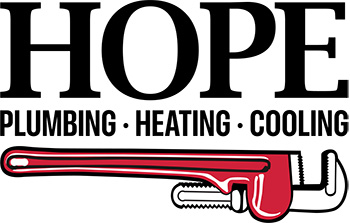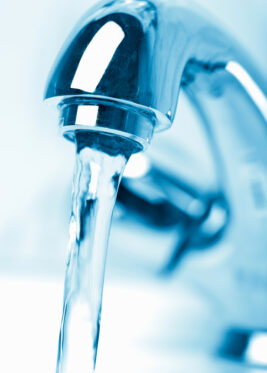Water softeners are an effective way to deal with hard water issues. These filtering systems remove excess calcium and magnesium that would otherwise build up in your plumbing. They are easy to connect to your water supply and can improve your water quality throughout your home. Learning more about water softeners can help determine if having one is the right option for your household.
Hard Water Problems
The term “hard water” describes drinking water that has absorbed large quantities of certain minerals from the ground. Hard water often occurs in mountainous or rocky areas of the country that are rich in limestone, gypsum, and chalk. As water filters down through the rock layer, it takes on extra magnesium and calcium. Hard water can even have dangerous levels of sulfur, which homeowners can often determine by the unpleasant smell and discoloration.
Water collected from lakes and streams tends to be naturally softer than groundwater. You can also artificially soften water with a water softener system. Drinking hard water will not typically negatively affect your health. In fact, human beings need these types of minerals in their daily diet. However, if your water has incredibly high levels of these minerals, you may experience some itchiness or discomfort after showering or washing your hands.
Hard water becomes a problem when the minerals build up in your appliances and pipes. Mineral scale can decrease the lifespan of your faucets, toilets, washing machine, and water heater. Common signs of hard water include water spots on your dishes and discolored or damaged clothing. Hard water also impacts your ability to create an efficient lather, making bathing and household cleaning more difficult.
Different Water Softeners
An ion exchange system is the most common type of water softener used in residential homes. This softener works by pulling the magnesium and calcium ions out of the water and replacing them with sodium ions. You may already be familiar with this water softener’s large tank that must be periodically refilled with salt pellets. Some homes use salt-free systems with a mechanical filter that pulls only calcium from the water. Unfortunately, this softener type won’t impact magnesium levels and does not work well with very hard water.
Reverse osmosis water softeners run your water through a partially permeable membrane that can pull out more than 98% of its impurities. This is one of the most effective types of water softeners available. However, it is expensive to install and uses a lot of water as it runs. It also pulls out so many vital minerals that you could actually develop deficiencies after prolonged use. Reverse osmosis water softeners are often used on an industrial or commercial level rather than in individual homes.
Ion Exchange Process
Water softeners that use an ion exchange process have a control valve, a mineral tank, and a brine tank. If you are interested in a smaller model, these tanks may be fused into one cabinet but are still separated within. In the mineral tank, minerals are removed from the water and the water is filtered clean. It is full of negatively charged resin beads that attract the positively charged calcium and magnesium particles. Over time, the beads become saturated and must be cleaned in the brine tank.
The plastic brine tank contains a solution saturated with potassium or salt. The resin beads are dipped in the brine to restore their negative charge and release their captured minerals. The brine tank is the part of the water softener that needs to be regularly replenished with pellets. These tanks are typically filled with salt but can also contain potassium if you have health concerns. Salt brine tanks might also be banned depending on your state because they may cause issues with septic systems. Potassium is more environmentally friendly and only costs a little more than salt.
The control valve is in charge of directing the flow of water during the regeneration process. This component decides when it is time to rinse the beads of their minerals. Older systems use timers, while newer models have digital meters that monitor total water usage.
Water Softener Pros and Cons
Installing a water softener will minimize buildup on your dishes, pipes, and fixtures. Softer water will make it easier to clean your home, body, and laundry. Decreasing how long it takes to create an efficient lather also lowers water usage and overall environmental impact. Soft water is also less drying on the skin and hair.
One of the potential disadvantages of using a water softener is the enhanced health risks to those with sodium restrictions. Ion exchange systems add several milligrams of sodium per quart of water. Water softeners also require regular maintenance and service. You must routinely fill the tank with salt to ensure it can effectively treat your hard water. Finally, some families feel that the texture of softened water is unpleasantly slimy or slippery.
Other Water Softener Considerations
Whether or not you need a water softener depends on the hardness of your local water. Experts recommend installing a water softener if the hardness of your water is higher than seven grains per gallon. You can determine your water hardness by purchasing a test from your home improvement store or contacting a local plumbing company, such as Hope Plumbing, Heating and Cooling.
The state of Indiana is known to have hard water. Even after your local water utility center treats it, the water will still arrive at your home with too much magnesium and calcium. Constant usage of this hard water will stain your fixtures and increase your risks of clogs and plumbing issues. You may also run into problems with your expensive appliances, like your dishwasher and washing machine, where they will need to be replaced prematurely.
Water softening systems lower the hardness of your water by pulling out specific substances. A water softener will not remove any other gases or minerals besides calcium and magnesium. For example, if you have manganese or ferrous iron causing unpleasant staining, a water softener will not solve your problem. These systems also do not treat foul rotten egg odors caused by excessive gases. Your water can be impacted by a malfunctioning water heater or by outdated plumbing. To determine if a water softener is an ideal option for you, contact our experienced plumbing team for water testing services.
Honest and Reputable Plumbing Company
Hope Plumbing, Heating and Cooling is a local plumbing team in Indianapolis, IN that offers services catered to your family’s needs. Our plumbers specialize in servicing old homes that might struggle with outdated fixtures and systems. We have more than 15 years of experience delivering exceptional service, upfront pricing, and state-of-the-art craftsmanship. Let us clean your drains, repair your gas lines, or evaluate your plumbing for leaks. We can also maintain and replace your sump pump, water heater, or water softener. Contact Hope Plumbing, Heating and Cooling today to learn more about water softeners and schedule a plumbing appointment in Indianapolis.


